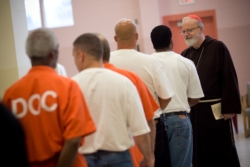From Cardinal Seán’s blog
On Wednesday [July 18] I visited Old Colony Correctional Center and Bridgewater State Hospital where there are actually four facilities that make up one compound.
We had a prayer service at one of the facilities, organized by chaplain Deacon Richard Monroe. They had a fantastic choir and a group of musicians who played at the bilingual service. The singing was extraordinary.
I visited the cell blocks there as well. In particular, I tried to visit those who are in solitary confinement.
From there I went to Bridgewater State Hospital and met with the staff and a number of the patients there. I was very moved by the situation in the hospital where some very sick people with mental problems live. Obviously, their mental problems have brought them into conflicts with the law. We had Mass in the auditorium for the patients and there must have been 150-200 people there. Peg Newman, the hospital’s chaplain, organized the Mass and did a wonderful job.
Superintendent Karin Bergeron was very impressive and compassionate. We also met Judge Minehan who works there. One of her assignments from the courts is to determine when people are liable for judgment or whether their mental capacity is such that they cannot be held fully responsible.
In the past, I found myself critical of how difficult it is for us in the United States to commit mentally ill people to institutions where they will get proper care. I was in Washington, D.C. when the Supreme Court ruled that no one could be held against their will unless they were deemed dangerous. That was, in some ways, the beginning of much of the homelessness in the United States. However, after speaking with Judge Minehan, I was very moved to hear her talk about the great lengths that we go to in this country to defend people’s civil rights and dignity and avoid doing what happens elsewhere. In some countries, people who are political dissidents or are considered nuisances are simply medicated and warehoused in some sort of institution. In our country, on the other hand, a real effort is made to determine someone’s mental health before the state intervenes.
Now, that does not gainsay our lack of preparedness to deal with the people whose mental health problems have put them on the street. That is another problem, but I was certainly impressed by the great respect that the judge has for the people that she serves there. She also talked about John Hinckley, Jr. who was involved in the assassination attempt against President Ronald Regan. She said that the testimony of his parents indicated how, from his childhood, he had mental problems that isolated him from the community. It was so obvious that he was very mentally ill and yet the reaction to the case was for legislatures to change the laws to make it all the more difficult for someone to plead insanity, she said.
... There is such tragedy behind these stories, and I was moved to see a whole hospital full of people whose lives have been so damaged. I know the suffering that it causes not only them, but their families and the communities that they come from.
I worked as a prison chaplain for two years when I was a young friar, and it has always been a ministry that I have found to be a great grace. Jesus said, “I was in prison and you visited me,” and we know that when we go to prison, we do find Christ there. I am very grateful to Deacon Bill Kane, director of the Office for Prison Ministry, and all of those in the archdiocese who are involved in this ministry. We have many religious, deacons, priests and lay people, particularly Cursillistas, who are giving retreats in the prisons and doing wonderful ministry there, helping people to find their way back to God.
Also in this week’s post
? Boston’s Syro-Malabar rite Catholics
? A visit with Archbishop Hughes of New Orleans



















